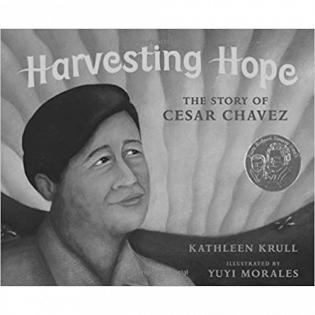Harvesting Hope Literature Guide
This books tells the real-life journey of Cesar Chavez, who moved with his childhood family of Mexican heritage from farm to farm as migrants, trying to earn enough money for food and housing. When he grew up, Chavez spoke up for fairness in pay and housing for farm workers, and he became a strong leader, famous for peaceful advocacy and words heard across the world. The story of Cesar Chavez demonstrates the role of empathy and an individual's power to use their voice to take social action and organize a community around a common goal.
Before Reading
Ask: What do you know about how our food gets from the farm field to the grocery store? Describe how it takes a community to get that done.
Show: Look at the picture of Cesar Chavez on the cover. Say, this Hispanic man is famous for using his words and mind to help many poor people earn a fair wage. Why do you think he would work so hard to help other people get paid a fair wage?
Connect: In the 1930s, many families in U.S. lost their farms, and they moved to California where there were farm jobs. There were no laws about how much to pay workers, and some made as little as 40 cents a day. The farm workers picking food were sometimes hungry themselves. Describe a situation where someone is working hard but not getting what they need.
During Reading
Ask: What are some of the things in a house and things we do in a house that turn a house into a home? How do you think Cesar's happy childhood impacted his work to help others?
Show: Compare the pictures of homes on the first few pages, including the happy family in the adobe home and the rough farm shelter. What do you think it was like to move as a family from the adobe house into the other?
Connect: What is empathy? Describe how empathy caused Cesar Chavez to help people who worked in bad conditions for very little money.
After Reading
Ask: What do Cesar's mother's words mean to "use minds and mouths" to work out conflict? In what situations can you use your mind and mouth to solve a problem?
Show: Look at the pictures of crowds celebrating and joining the effort. Cesar reminded everyone of what the victory was: "Some of the wealthiest people in the country had been forced to recognize some of the poorest as human beings." In what ways were farm workers treated as if they were not human beings? Discuss the idea that it is racist to act as if some people have more value than others.
Connect: Cesar led a 300-mile march from the grape farm to the state capital of California to ask law makers for fair conditions. In the book, we see people join and help them along the way. The attention caused the grape farm owners to agree to better conditions for farm workers. What unfair things would you like to ask law makers to change?
Reflect: What does the title Harvesting Hope mean to you? Why is it a good title for this book?
Activities
- Compare Cesar Chavez to Gandhi or or Malala Yousafzai. Why did they give so much time to work for justice? Tell about a time you spoke up for someone, or a situation where you can speak up soon.
- Not all houses look the same. Some people live in adobe houses, tents, cabins, huts, and even cars. Other people live in ranch homes, two-storied houses, farms, apartments, and shelters. Draw two very different homes with families in them enjoying life together.
- Talk to a grandparent or older relative. Ask them to tell you stories about community life long ago. What did they do for others? What did their community do for them?
- Draw a picture of the main idea of the story. Use color to show mood and culture.
- Find a song that describes the mood or theme of the book. Or, pick a song you think the main character would like.
- Read about women doing social justice work, such as Delores Huerta, Rigoberta Menchu, Rosa Parks, Dorothy Height, Malala Yousafzai, Mother Teresa, or Greta Thunberg.
- In promoting the National Farmworkers Association, Cesar Chavez and Delores Huerta used simple images with simple words to communicate their message. Make an advocacy poster to promote change important to you.
